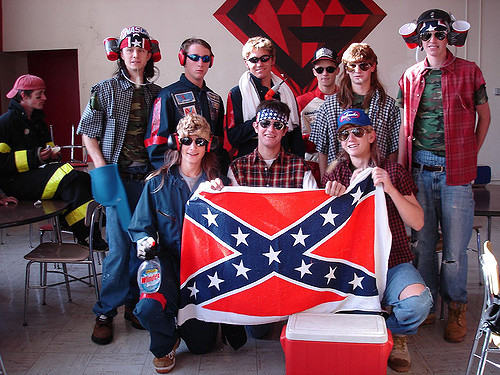It’s hard to tell who is more alarmed by the prospect of Donald Trump as the Republican presidential nominee: Democrats or Republicans. Democrats are upset by Trump’s overt racism. Republicans worry that these things might make it hard to get him elected.
But there is one group of Americans for whom none of these considerations don’t cut much ice at all: poor whites. Courted for decades (at least after a fashion) by the major political parties in this country, in the last 20 years, poor whites have become the stepchildren of American politics.
It will not be news to anyone that questions of race have suffused American politics from the earliest days of the republic. But the valence of racial politics changed in the wake of the Civil War.
With non-whites now admitted to the polity, at least in a formal sense, whites at the lower end of the income distribution became an object of ideological and political interest.
In the course of the war itself, mass participation of poor whites on the Confederate side had been achieved via a politics of national/local self-defense. This obscured the fact that the underlying cause of the war was the defense of the institution of slavery, in which poor whites not only had no interest, but which actually ran counter to their interests by artificially depressing prices for agricultural products.
This nationalist/localist politics was buttressed by a virulent racist discourse, making calculated use of the fear inspired by the prospect of slave violence (especially but not exclusively against white women).
Reconstruction saw a momentary loosening of this system, at least in some parts of the south, followed by its gradual reassertion through the media of Jim Crow laws and the Ku Klux Klan. The Democratic Party showed itself to be particularly adept at employing the politics of racial threat and disparity to keep poor whites onside.

So it went through much of the 20th century. Capitalism, which is not intrinsically connected to race, employed it as a tool to maintain a stable and productive social order. When times were bad, poor whites could be counted on to defend racial privilege in solidarity with those further up the income distribution.
When the postwar boom took off in the two decades following the Second World War, the hour of poor whites struck. The acceleration of economic growth gave them access to better paid, more stable employment and, thereby, to wider segments of the commodity culture.
But, as is always the case with capitalism, the boom would not last. Wages began to stagnate in the early 1970s (and have continued to until the present day). Capital became more mobile. Factories shifted easily to lower wage regions, or out of the country entirely.
At the same time, movements for racial equality were viewed as a diminution of the prerogatives of whites, who had for long been told that the politics of race were a zero sum game. While they were still courted by the political parties, the substance of the patronage on offer gradually melted away, and poor whites from Cleveland to Birmingham were left to eke out an existence in the rusting ruins of a bygone era of industrial prosperity.
Since the Reagan Revolution of the early 1980s, the Republican Party has progressively superseded the Democrats as the institutional repository of the fears and expectations of poor whites. Through decades of wage stagnation and deindustrialization, poor whites were fed a steady diet of anti-government rhetoric and racial dog whistles.
The key to the system was that much of its grimmer content was concealed by knowing nods and winks. Republican political rhetoric became progressively more extreme, as the culture of media consultants and spin doctors preached the competitive value of maximalism in and for itself. Donald Trump is the mutant product of this toxic political culture.
Trump’s rise to frontrunner status in the Republican primaries has been built on the back of concentrating just the sort of poor white rage that the Republican Party has been cultivating for decades. The difference is that, whereas earlier candidates were content to use coded language and dog whistles, Trump has had the temerity to actually say these things out loud.
This is bad news for a Republican establishment that needs to find a balance between motivating its base, which comprises a large number of racists, xenophobes, and conspiracy enthusiasts, and trying not to get so lost in crazy that they alienate the more centrist voters. In truth, plenty of the centrists are racists, xenophobes, and conspiracy enthusiasts too, but they retain just enough sense of decorum that they might be put off by having such sentiments plainly expressed.
One of the real peculiarities of Trump’s success is that he has rejected the commitment to untrammeled free trade that has been a nostrum for both major parties for the best part of the last century. Paeans to free trade hold central places in the economic song books of political elites, both in the United States and throughout the industrialized world (and not only there.)
Selling this policy to people down the income distribution requires a certain amount of ideological gymnastics.
After all, jobs shipped overseas and a cheap products produced in low wage zones are tangible to workers and owners of domestic businesses. The benefits that accrue from free trade, less so. One frequently hears the phrase “a rising tide lifts all boats” as a sort of back-of-the-envelop justification for these policies. But the fact of the matter is that when the tide comes in a lot of people end up getting swamped.
What Trump has done is to manage to tap a direct line into the reservoir of anger that the Republican establishment has been collecting as a guarantor of its political fortunes. They have done so, at least in part, by performing a sort of ideological ventriloquism in which poor whites have been convinced to continually utter Horatio Alger-style platitudes.
But now those same poor whites are trapped in a decaying, post-industrial landscape, and are increasingly prone to the sorts of pathologies (long term unemployment, alcohol and drug abuse, bankruptcy, skill degradation, etc.) that come with it.
These are social pathologies with which African Americans are well-acquainted. A large proportion of this group has spent decades trapped in capital-starved, red-lined communities, and been told repeatedly by the white establishment that their failure to thrive was due solely to their own lack of discipline and enterprise.
Thus it must have come as a painful shock (at least to those poor whites of a more literary cast of mind) to see the articles published lately in the National Review (The Father Führer, Working-Class Whites Have Moral Responsibilities — In Defense of Kevin Williamson) in which they are addressed with that same smarmy, patronizing tone usually reserved for minorities and other kinds of people that respectable opinion infantilizes.
Raised on narratives of the zero-sum racial society and now consigned to the backwaters of international economic development, poor whites in the United States have flocked to Trump’s banner because he tells them the kinds of things they want to hear. His brand of rightwing populism is nothing new, and (for the record) wasn’t new when Hitler employed the same tactic in the 1930s. What it is, is big trouble for the Republican establishment.
Up to now, this august class fraction has managed to maintain a patina of respectability, even while its candidates (from Rubio, to Cruz, to Rick Perry, and beyond) have ridden the crazy train all over this country. But now the cat is out of the bag, and the far fringe of the right wing of the Republican base is wagging the dog right out of contention in the general election. For the last 40 years, the Republican establishment has sown the wind; they are now reaping an angry white whirlwind.
Photographs courtesy of Call It Crazy, and John Kittelsrud. Published under a Creative Commons license.





